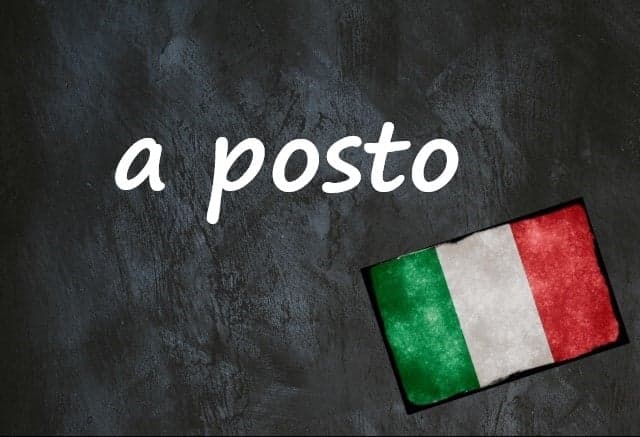Italian expression of the day: 'A posto'

Remember this phrase and you'll be all good.
A posto is something we'd all like to be: it means 'alright', 'sorted', 'settled'.
The phrase translates directly as 'in place'. Think of it as describing a situation where everything is exactly where it's meant to be: now isn't that a nice image?
Se lo troviamo, siamo a posto.
If we find it, we're sorted.
It's not always figurative: a posto can also mean literally in the right place, i.e. 'neat' or 'in order'.
Metti a posto la tua camera!
Tidy your room! (literally, get your room in order)
But all sorts of other things can be 'in order' too – like the way you think, the way you speak, even your hands.
Sai tenere la lingua a posto?
Can you hold your tongue? (literally, keep your tongue in place)
Non ha la testa tanto a posto.
He's not right in the head. (his head's not in place)
Tieni le mani a posto!
Keep your hands to yourself! (keep your hands in place)
Even a person can be 'in order', if they're honest or decent.
Sembra veramente un tipo a posto.
He seems like a real stand-up guy.
È gente a posto.
They're good people.
But the best way to be a posto, as far as we're concerned, is when everything's alright: tutto a posto.
– Ti serve qualcosa?
– Non grazie, tutto a posto!
– Do you need anything?
– No thanks, it's all good!
– Tutto a posto?
– Perfetto, grazie.
– Everything alright?
– Great, thanks.
You might hear Italians pronounce this last one more like "tutto posto" or "tutt'a posto": that's fine in casual speech, but if you're writing be sure to spell out all three words.
Nor is tutto a posto to be confused with tutto apposto, which is such a common mistake among Italians that the dictionary has a clarification on it: while the first, as you now know, means 'everything in place', the second translates as 'everything placed' or 'everything affixed'. And that's definitely not alright.
Do you have a favourite Italian word, phrase or expression you'd like us to feature? If so, please email us with your suggestion.
Don't miss any of our Italian words and expressions of the day by downloading our new app (available on Apple and Android) and then selecting the Italian Word of the Day in your Notification options via the User button.
Comments
See Also
A posto is something we'd all like to be: it means 'alright', 'sorted', 'settled'.
The phrase translates directly as 'in place'. Think of it as describing a situation where everything is exactly where it's meant to be: now isn't that a nice image?
Se lo troviamo, siamo a posto.
If we find it, we're sorted.
It's not always figurative: a posto can also mean literally in the right place, i.e. 'neat' or 'in order'.
Metti a posto la tua camera!
Tidy your room! (literally, get your room in order)
But all sorts of other things can be 'in order' too – like the way you think, the way you speak, even your hands.
Sai tenere la lingua a posto?
Can you hold your tongue? (literally, keep your tongue in place)
Non ha la testa tanto a posto.
He's not right in the head. (his head's not in place)
Tieni le mani a posto!
Keep your hands to yourself! (keep your hands in place)
Even a person can be 'in order', if they're honest or decent.
Sembra veramente un tipo a posto.
He seems like a real stand-up guy.
È gente a posto.
They're good people.
But the best way to be a posto, as far as we're concerned, is when everything's alright: tutto a posto.
– Ti serve qualcosa?
– Non grazie, tutto a posto!
– Do you need anything?
– No thanks, it's all good!
– Tutto a posto?
– Perfetto, grazie.
– Everything alright?
– Great, thanks.
You might hear Italians pronounce this last one more like "tutto posto" or "tutt'a posto": that's fine in casual speech, but if you're writing be sure to spell out all three words.
Nor is tutto a posto to be confused with tutto apposto, which is such a common mistake among Italians that the dictionary has a clarification on it: while the first, as you now know, means 'everything in place', the second translates as 'everything placed' or 'everything affixed'. And that's definitely not alright.
Do you have a favourite Italian word, phrase or expression you'd like us to feature? If so, please email us with your suggestion.
Don't miss any of our Italian words and expressions of the day by downloading our new app (available on Apple and Android) and then selecting the Italian Word of the Day in your Notification options via the User button.

Join the conversation in our comments section below. Share your own views and experience and if you have a question or suggestion for our journalists then email us at [email protected].
Please keep comments civil, constructive and on topic – and make sure to read our terms of use before getting involved.
Please log in here to leave a comment.